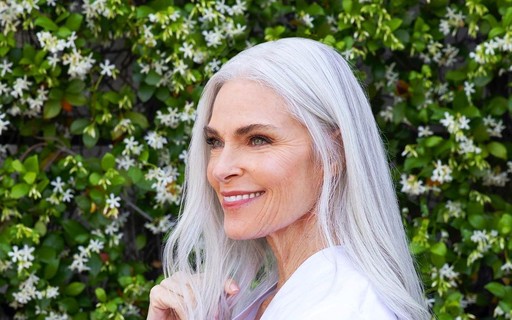The body changes during menopause (Image: Instagram / @roxmod)
Menopause is the end of a woman’s reproductive cycle. The definition is simple, but the meaning goes much further than that. It could be a promising start. A period of discoveries, to take a fresh look at what really happened. Above all, pay more attention to health. After all, menopause occurs, on average, in middle age.
Therefore, we have put together powerful material on how to take care of your body and mind to live out this transitional period in the most productive, healthy and safe way possible.
Main symptoms
Feeling satisfied with life is essential at any stage, and menopause is no different. However, according to the Menopause Guide, prepared by the Brazilian Climacteric Society (SOBRAC) in partnership with the American Menopause Society (AMS), about 43% of women complain of a lack of energy, mood swings, and anxiety during the transition. Two years.
In addition to these symptoms, most people notice a decrease in libido, vaginal dryness, and a loss of skin firmness. No wonder the arrival of menopause has already been a cause of sadness and frustration for many women. “Today they want to enhance their maturity and raise their self-esteem, not only in terms of appearance, but also in mental and sexual aspects,” says gynecologist Vivian Monteiro.
Luxury and quality of life
Women’s Health provides advice on wellness and lifestyle after menopauseWith tips on how to basically maintain a healthy pattern, The 40+ – Women’s Health book collects wellness tips for women 40 and older, with a focus on post-menopause.
For Marie Claire, experts have made a small guide to stopping inflammatory processes in the body, such as: Include some nutritional supplements, such as glutamine, vitamins A, C, D, B5 and minerals, such as silicon, zinc and omega-3, which help restore gut health.
Can a wellness routine reduce the effects?
The hormonal changes caused by menopause can have different effects on the body, from skin to mood and sleep. Maintaining a healthy routine helps reduce the effects of menopause.
“A very important tip is to increase the consumption of good fats such as avocados, almonds, chestnuts and all oilseeds and minerals, such as zinc, which are directly related to the formation of hormones such as testosterone,” Pedro Andrade, one of the pioneers of precision medicine in Brazil.
skin health
The protein responsible for uniting cells, Collagen supports the fibers and gives strength to the muscles. And around the age of 25, 30 we start losing it, and the lack of collagen also causes a high degree of dryness in the skin, a lack of vaginal hydration and a low antioxidant capacity. During perimenopause, this annual decline increases, causing more visible signs of aging.
“The epidermis, the skin’s most superficial layer, acts like a wall. The horny cell, the cell that makes up the epidermis, is the “brick,” and the lipid is the “cement.” Biochemist Fernanda Chauvin explains that when the body reduces production of the “cement” that seals the wall, It loses water and the skin is more exposed to toxins.
Is it possible to get pregnant naturally during menopause?
The answer is no. Of course, this is not possible.There are no more eggs in the body to be fertilized. “The end of the menstrual cycle occurs when the female reproductive system experiences ovarian failure, that is, when there are no live eggs in the ovary,” explains obstetrician-gynecologist Leticia Piccolo.
Can hormonal treatments affect fertility?
Replacement with hormones can increase the chances of pregnancy, Even in menopause. Since Claudia Raya announced her third pregnancy, her name has not left the news and social networks. At the age of fifty-five, the pregnancy was surprisingly announced, which raised many questions precisely because Claudia Raya has already announced, since 2019, that she is in menopause, a period that theoretically marks the end of the reproductive age.
The actress and dancer said she started estrogen hormone therapy to prepare the body for in vitro fertilization at the end of 2021. “Menopause is not a reversible condition. However, in some cases, it is possible for a pregnancy to be viable, if there are still eggs in the ovary, Even if it’s in small amounts, says gynecologist Wellington Bala.
new stage
When talking about menopause, the first thing that comes to mind are hot flashes, loss of libido, and vaginal dryness – real symptoms of the hormonal changes that are taking place. But some women viewed positively other points that are also part of this phenomenon.: the end of menstruation (and all that comes with it) and the possibility of pregnancy.
Emancipation, for some, has to do with ending menstrual discomfort and other obligations that society places on women. “I quit menopause in me. I found that I needed light clothing and it wouldn’t hurt me. I gave up on horrible waxing sessions,” educator Silvana Rodríguez de Moraes, 56, recounts.

“Hardcore beer fanatic. Falls down a lot. Professional coffee fan. Music ninja.”



![[VÍDEO] Elton John’s final show in the UK has the crowd moving](https://www.tupi.fm/wp-content/uploads/2023/06/Elton-John-1-690x600.jpg)


More Stories
The Director of Ibict receives the Coordinator of CESU-PI – Brazilian Institute for Information in Science and Technology
A doctor who spreads fake news about breast cancer is registered with the CRM of Minas
The program offers scholarships to women in the field of science and technology